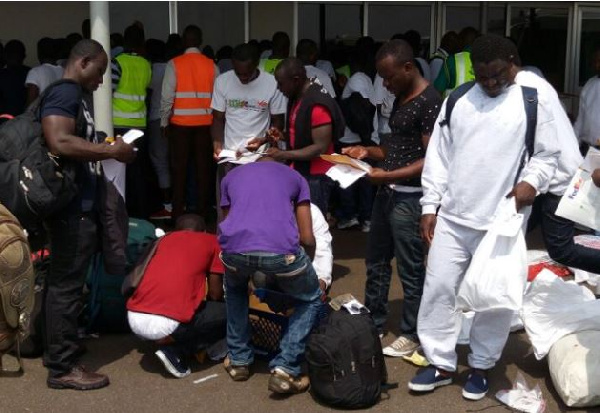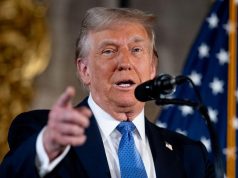The United States of America has deported 642 Ghanaians convicted of various offences, including acts that undermined border control and the integrity of the US immigration system, in three years.
A report on the activities of US Immigration and Customs Enforcement (ICE) and Enforcement and Removal Operations (ERO) in the 2018 fiscal year said the Ghanaians were deported between 2016 and 2018.
According to the report, 94 Ghanaians were deported from the USA in 2016.
In the year 2017, the number of Ghanaians deported from the USA witnessed an astronomical 69.1 per cent jump to 305.
However, in 2018, the number of Ghanaians deported from the USA dropped to 243, a decrease of 25.5 per cent.
Enforcement and Removal Operations (ERO) identifies, arrests and removes aliens who present a danger to national security or a threat to public safety, or who otherwise undermine border control and the integrity of the US immigration system.
Immigration and Customs Enforcement (ICE), on the other hand, shares responsibility for administering and enforcing the nation’s immigration laws with US Customs and Border Protection (CBP) and US Citizenship and Immigration Services.
The removal of African migrants went up – in some cases, more than doubling.
Despite a six per cent drop in overall removals, there was a significant rise in removal of migrants from countries such as Gambia, Niger, and Senegal.
On January 25, 2017, President Donald J. Trump issued an Executive Order, Enhancing Public Safety in the Interior of the United States.
It set forth the administration’s immigration enforcement and removal priorities.
Subsequently, on February 20, 2017, the Department of Homeland Security’s (DHS) implementation memorandum, Enforcement of the Immigration Laws to Serve the National Interest, provided further direction for the implementation of the policies set forth in the Executive Order.
Together, the Executive Order and implementation memorandum expanded ICE’s enforcement focus to include removable aliens who have been convicted of any criminal offence, aliens charged with any criminal offence that has not been resolved, and those who committed acts which constitute a chargeable criminal offence.
Others are persons who have engaged in fraud or wilful misrepresentation in connection with any official matter before a governmental agency, persons who have abused any programme related to receipt of public benefits, those who are subject to a final order of removal but have not complied with their legal obligation to depart the United States, and in the judgment of an immigration officer, otherwise pose a risk to public safety or national security.
The department continued to operate under the directive that classes or categories of removable aliens are not exempt from potential enforcement.
Ghana, US tango over visa restrictions
Ghana and the United States of America are in a tussle over plans to deport over 7,000 Ghanaians from the US to Ghana.
While the USA said Ghana has since 2016 not adequately co-operated to provide travel documents for the affected persons, Ghana disagrees.
This year, the US imposed visa restrictions from February 4, 2019 as its embassy in Accra discontinued issuing all non-immigrant visas (NIV) to domestic employees (A3 and G5) of Ghanaian diplomats posted to the US.
Consular officers also limit the validity period and number of entries on new tourist and business visas (B1, B2, and B1/B2) for all Ghanaian executive and legislative branch employees, their spouses, and their children under 21 to one-month, single-entry visas.
It said since July 2016, the US Government had engaged with the Government of Ghana in both Washington DC and Accra on the matter without much success.
US visa sanctions on Ghana unjustified – Foreign Affairs
But, the Ministry of Foreign Affairs and Regional Integration expressed disappointment with the decision by the United States to implement visa sanctions on Ghana for alleged lack of adequate co-operation in accepting Ghanaian nationals ordered removed from the US.
It said those allegations were unfounded, and the sanctions imposed on Ghana were without any justification.
Ghana, as a sovereign country, has the duty to, and would continue to, protect her nationals all over the world by ensuring that appropriate processes were undertaken in all issues relating to her citizens’ deportation from other countries, the ministry said.
A statement issued by the ministry’s Public Affairs Directorate said the government had always co-operated with the US authorities in the processing and removal of Ghanaian citizens who had been cited for deportation from the US to Ghana.
It said the Government of Ghana was worried about past experiences where Ghanaian deportees were sent home in belly chains and physically cuffed to their seats on the aircraft.
It, therefore, urged the US Government to recognise and ensure the deportation processes are consistent with international best practices and national laws, and must uphold the dignity of the people involved at all times, including those convicted of crimes.
The statement said the ministry was assessing the situation and would institute appropriate measures within the context of international laws and bilateral relations between the two countries in due course.
It said in accordance with international laws, the Ghana Embassy in Washington DC undertook identification and verification processes to ensure that all persons earmarked for deportation to Ghana are bonafide citizens of Ghana.
Countries all over the world undertook those processes to accept their deported citizens, and it is not peculiar to Ghana and the US situation, the statement said.
It said the identification and verification mechanisms had stipulated timelines and procedures, which were communicated to the deporting authorities at all times.
Ghana issues travelling certificates to 11 in January
As of January 8, 2019, Ghana’s Mission in Washington DC had received 20 applications from the US authorities, out of which 19 had been interviewed by the embassy and 11 travelling certificates issued for their travel back to Ghana.
Those outstanding are as a result of doubt on their Ghanaian nationality, ill-health, and pending litigation in US courts.
The statement said the US authorities had verbally informed the ministry that there were about 7,000 Ghanaians who were at different stages of deportation proceedings.
However, there has not been any confirmation by the US authorities of a final court order for their removal in accordance with the US’ own laws.
It, therefore, expressed surprise that the US authorities would ignore the international protocols that need to be observed in matters of deportation and make allegations of lack of co-operation by Ghana.
The Department of Homeland Security (DHS) on Friday, February 1, 2019, announced, in co-ordination with the Department of State, the implementation of visa sanctions on Ghana due to lack of adequate co-operation in accepting her nationals ordered removed from the United States.
It said it is in pursuant of the US authority, under Section 243 (d) of the Immigration and Nationality Act (INA), that Secretary of Homeland Security, kirstjen Nielsen, notified Secretary of State Mike Pompeo that the Government of Ghana had denied or unreasonably delayed accepting its nationals ordered removed from the United States.
As a result, Secretary of State Pompeo has ordered consular officers in Ghana to implement visa restrictions on certain categories of visa applicants.
It said without an appropriate response from Ghana, the scope of those sanctions may be expanded to a wider population.
The sanctions would remain in place until the Secretary of Homeland Security notifies Secretary Pompeo that co-operation on removals had been approved to an acceptable level.
US Embassy visa restrictions
A statement issued by the US Embassy said: “It is important to note that A3 and G5 visa applications will be processed, but no visas in these categories will be issued while these restrictions remain in effect.”
It said the lack of adjudication did not mean a visa denial, adding that, “The application will remain pending until the visa restrictions are lifted, at which point the visa application will continue to be processed for issuance.”
The statement reminded countries which have signed on to the UN Convention on International Civil Aviation that they are obligated to issue the necessary travel documents to its citizens under deportation orders from another country.
Section 243(d) of the US Immigration and Nationality Act says when a country is determined to be denying or unreasonably delaying accepting the return of its nationals, the US Government institutes visa restrictions until the situation is resolved.
It said all other consular operations at the US Embassy in Accra would continue as normal at this time.
These visa restrictions would not affect other consular services provided, including adjudication of applications from individuals not covered by the imposition of the restrictions (for example, student visas).
The US values its vibrant partnership with Ghana, and remains committed to working together with the Government of Ghana to resolve the situation, it added.








